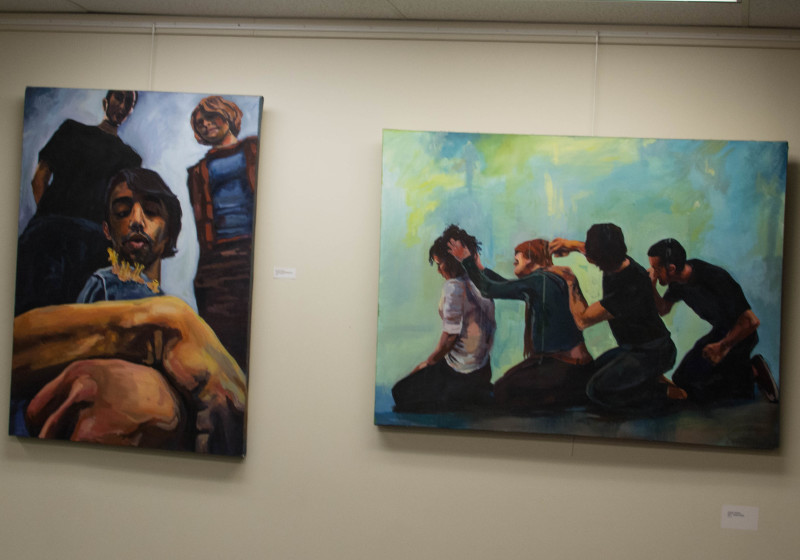Walking past the Art & Music Library, you may have noticed the unique art that lines the walls outside. Piquing students’ interest, these pieces have left many wondering where they came from and why they’re there.
Marc Bollmann, Senior Library Assistant for the Art & Music Library, explained that an art committee, containing both library staff and faculty members, was formed to “put art in various library spaces that celebrates student as well as faculty work.”
“The place where students live, study, and develop cognitive abilities needs to be culturally conscious,” added Associate Professor of Art Allen Topolski, who is also on the committee. “Art advances the way we think about the world we inhabit, and art in public spaces provides common ground for exchange of ideas. The presence of visual art establishes habits of mind that affect the way we traverse experience.”
Bollmann said this area was chosen to display the art simply because the walls were blank. The Art & Music Library already had a space at its entrance to display student works, so “it seemed like a natural extension to bring art into the public spaces.”
Currently, all work on display is by students.
“Most of the works in that hallway now are owned by the Art & Art History department,” Topolski said. “Most of them came into ownership through a purchase prize that is given in either the annual undergraduate juried exhibition in Hartnett [Gallery], or from the studio art majors’ senior thesis exhibitions.”
Bollmann said that a piece is chosen if it moves the committee. They are not solely chosen for their technical prowess or aesthetic appeal, Topolski added,“they are meant to be engaging and thought-provoking.”
The pieces that are currently on display have been there for a few years, and the committee has plans to eventually switch them out with other pieces, possibly by commencement in May.
“They will go back to their permanent home with Art & Art History,” said Bollmann of the current works. “We’ve gone to Sage and looked at a recent 2-D show that they’ve had up, and we’ve picked out our favorites to bring into the hallway.”
Hanging art directly on the walls is costly, requiring asbestos abatement, so a railing system was set in place to allow the paintings to be hung easily.
Bollman said that the rail system is already in place between the elevator and the Digital Humanities Center. Topolski noted that repurposable frames for swapping out prints and drawings were currently being planned to allow for easier and more regular switching of student pieces. Once the frames are acquired, their goal is to have student work featured throughout the entire hallway—all the way to ITS.
Bollmann said that the current works are limited to photography, digital images, and illustrations because “three-dimensional work is harder to tie down.”
The benches outside the Art & Music Library were commissioned from two local artists. They are bolted into the concrete, so they are not at risk of being stolen. Any other sculptures, however, might pose a challenge to security.
One section of interest in the current gallery is the pair of drawings both titled “Girl Math.” The original artwork, by Anna Saltman ’15, was a graph displaying insecurities of girls. It was recently responded to by junior Lia Klein, with a piece featuring actual math proofs.
“Lia wanted to offer a real equation for those not recognizing the irony of Anna Saltman’s piece,” Topolski said.
“I’ve been walking past Anna’s ‘Girl Math’ piece for however long its been up,” Klein said, “and every single time I would see it would bother me because I didn’t realize she was being ironic. I thought that she was actually saying that girl math is counting calories.” Her response intended “to send the message that girl math is just math.”
Despite now understanding that the piece is meant to be ironic, Klein chose to leave her artwork up. “I still have the piece up because I don’t think that the original intent of the artist is that important,” she explained. “What’s more important is how the piece is perceived. If I didn’t realize that the piece is ironic just by looking at it, is it really ironic?”
“I believe that people will continue to walk past that piece and not realize the irony, as I did for so long. And as long as that’s happening, I want my piece up next to it as a response.”
Sophomore Gabrielle Scullard said that the response to “Girl Math” was her favorite piece. “I really like the idea that girl math isn’t different from ‘boy math,’” she said. “‘Girl math’ is just math—because math shouldn’t be gendered. It’s really important to me as a female and as a math major to have that hanging there as a response.”
Other pieces include one with a watermelon seed sprouting in someone’s stomach, and one of a sheep jumping down a flight of stairs. Those two are from a series of six that “illustrate or diagram rules for behavior that [the artist] saddled himself with in his youth—a kind of self-indoctrination,” according to Topolski. For example, the image of the watermelon seed refers to the belief that if someone eats a watermelon seed, a watermelon plant will sprout from his or her stomach. Topolski said that, for the sheep piece, the childhood trick of counting sheep to fall asleep and the number of steps the artist could jump down “merged illogically.”
Regarding the possibility of any future three-dimensional installations in the space, Bollmann said that there is a ten-year plan for the building concerning all 2-D and 3-D art. “Eventually, the Art & Music Library will be relocated to a new location, and that’s far down the line,” he said. For now, though, the space will remain two-dimensional but thought-provoking as ever.




